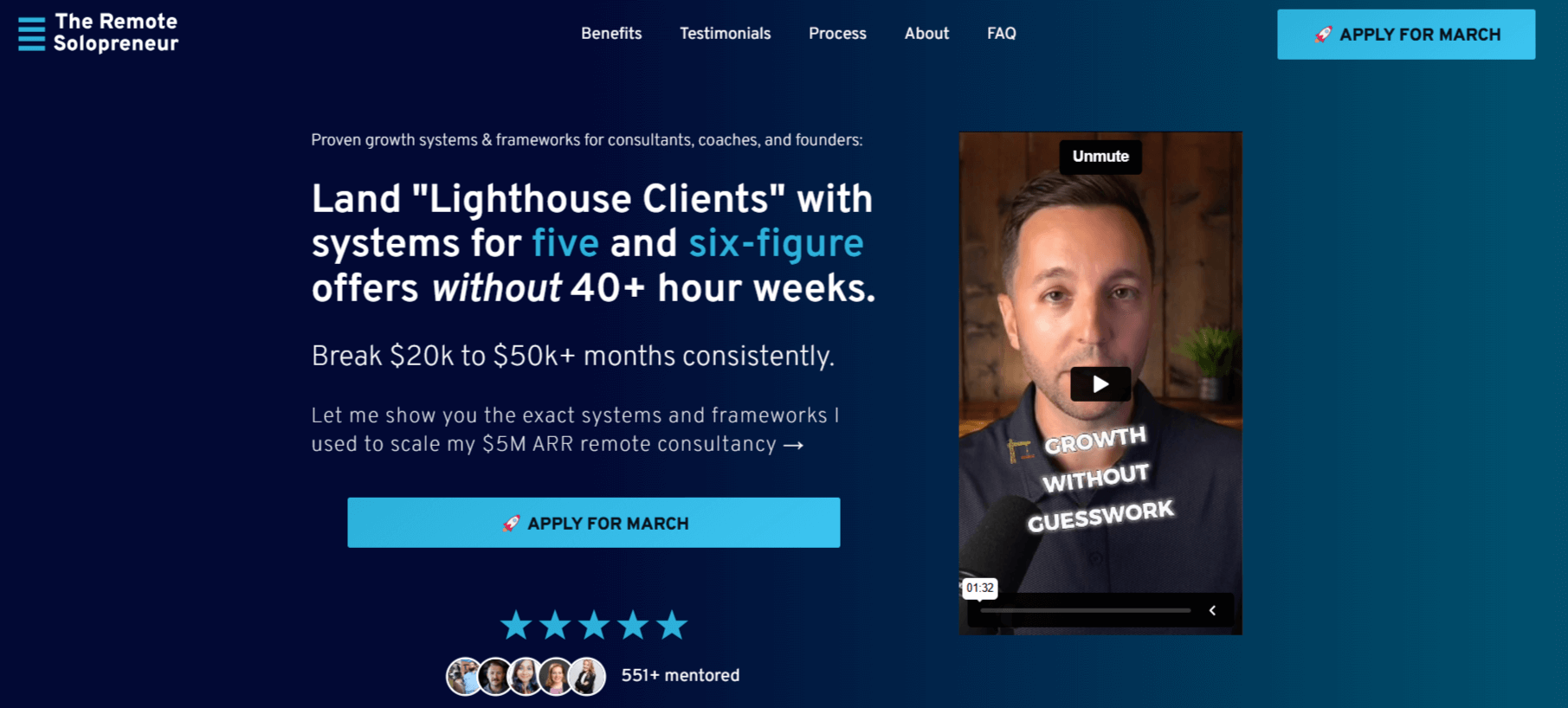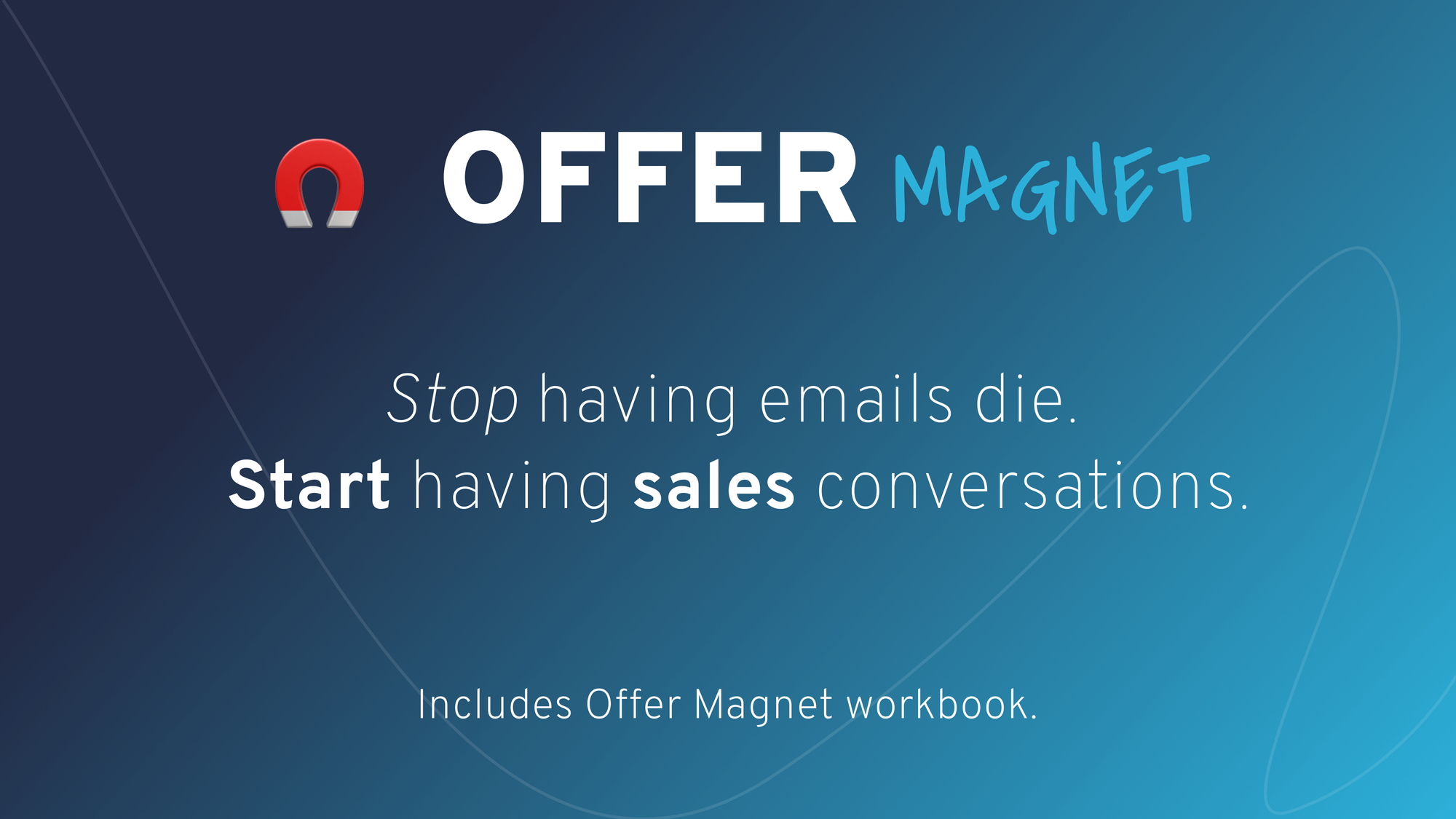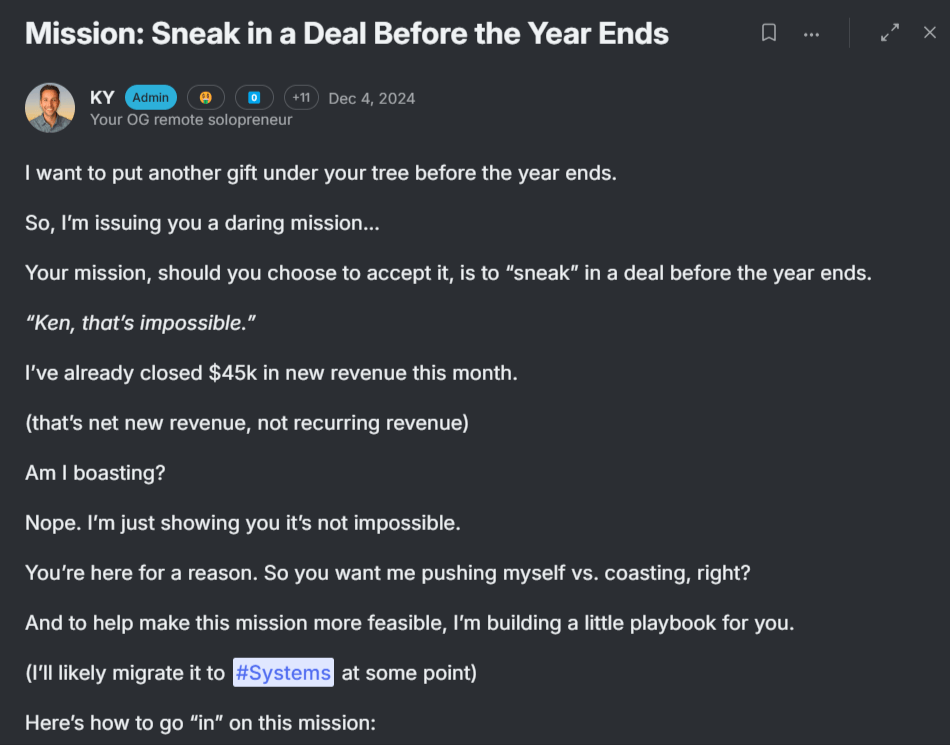🚀 TL;DR
- Solopreneurs often struggle less with “doing work” than with isolation, decision fatigue, and lack of feedback.
- You need to build a “support system” composed of communities, mentors, accountability partners, tools, advisors, and professional relationships to avoid this.
- Not every support structure needs to be complex — start with one or two pressing weaknesses (e.g. no community, no tech stack), then expand.
- Technology stack and automation are emphasized: invest in tools that remove friction and scale your capacity rather than just add complexity.
- Self-care, boundaries, and preserving mental health are not optional — they directly impact sustainability and decision quality.
The hardest part of solopreneurship isn’t the work—it’s having no one else to bounce ideas off of each day. It's loneliness.
You’re in your own head all day.
That’s the reality most solopreneurs don’t talk about when they post their highlight reels on LinkedIn. I’ve been remote since 2005, and I’ve seen it all: the isolation, the decision fatigue, the moments when you question everything.
When you’re the only person in your business, you carry the weight of every decision. There’s no team meeting to bounce business ideas off colleagues. No manager to give you feedback. No built-in structure to keep you on track.
But here’s what I’ve learned after mentoring more than 551 consultants, founders, and solopreneurs: you don’t need employees to succeed, but you do need people.
In this guide, I’m going to show you exactly how to create a solopreneur support system—so you can keep your independence without sacrificing your sanity or your growth potential.
1. Join a solopreneur community
Building a one-person business doesn’t mean you have to do it alone.
When I started my first remote business, I had no community. I made every mistake in the book because I had no one to warn me about the pitfalls ahead. Today, I run a thriving community of experts called The Club, but it took me years of isolation to realize what I was missing.

A good solopreneur community gives you three critical things:
- Real-time feedback from people who understand your specific challenges.
- Shared resources that save you hundreds of hours of trial and error.
- Mental reinforcement when you’re doubting yourself or your business.
That’s why you need to join communities that don’t just offer a shared space—but are run by people who are still in the trenches and offer group mentorship programs too.
Most solopreneurs join communities that are too broad or too basic. They end up in Facebook groups with 50,000 members but no real connections. Or they join mastermind groups filled with people who have completely different businesses and challenges.
The right community matches your business model, growth stage, and values.
Look for structured communities built specifically for solopreneurs who want to grow without traditional hiring.
Your business is too important to navigate on your own.
2. Work with a business mentor
You’d never see a professional athlete without a coach.
Yet most solopreneurs try to coach themselves.
Working with a mentor who has built and scaled a business like yours changes everything. Not a career coach who’s always been a coach. Not a guru selling courses about making money. Someone who’s been in the trenches and still is.
Most solopreneurs jump into coaching too early. They think a coach will solve their problems before they’ve even clearly defined what those problems are.
Get moving on your own first. Then, find a mentor when:
- You’ve hit a ceiling and can’t break through it alone.
- You’re making consistent revenue but feel stuck in day-to-day operations.
- You want to scale without hiring but don’t know how.
- Your business model works, but you’re burning out trying to maintain it.
When looking for a mentor, verify they’ve done what you want to do. Most haven’t.
Ask them specific questions about their experience building a business like yours. Look for concrete examples, not vague success stories.
Every plateau I’ve broken through in my business came after working with someone who had already solved the problem I was facing.
Your time and energy are limited. A good mentor helps you focus on what moves the needle.
3. Participate in co-working sessions or spaces
Your physical environment shapes your mental performance.
Working from the same space day after day—often your kitchen table or spare bedroom—creates mental stagnation.
There are two approaches to co-working that I recommend to the solopreneurs I mentor:
Physical co-working spaces where you can interact with other business owners face-to-face.
Virtual co-working sessions where you log on with other solopreneurs and work alongside each other with cameras on.
Also, co-working doesn’t have to be expensive or complicated.
You can start with free virtual co-working sessions through communities like Focusmate. Or you can drop in at local co-working spaces once or twice a week instead of committing to a monthly membership.
You can even organize informal co-working with other solopreneurs in your area at a local coffee shop.
The key is consistency. Schedule co-working into your calendar like any other important meeting. Treat it as non-negotiable.
4. Upgrade your technology stack
The right tools turn one person into ten. The wrong tools waste hours of your life each week.
As a solopreneur, your technology stack is about multiplication. Each tool should remove tasks from your plate or dramatically speed up the ones that remain.
I’ve helped hundreds of solopreneurs audit their tech stacks, and I consistently find they’re using tools built for teams, not solo operators.
Your needs are different. You need tools that:
- Require minimal management and maintenance.
- Work together seamlessly without constant tweaking.
- Solve specific problems rather than trying to do everything.
- Automate repetitive tasks that drain your energy.
Most solopreneurs use too many tools that do too little. Or worse, they use massive all-in-one platforms that are overkill for their needs.
Start by mapping your core workflows. What do you do repeatedly in your business? Those are the processes worth automating or enhancing with the right technology.
For example, I use Fathom as an AI meeting note-taker instead of hiring someone to take notes on client calls. This gives me the benefit of perfect meeting records without the overhead of an employee.
I recommend Trello for project management, Notion for knowledge management, and Zapier for automation between tools. Each is best-in-class for its specific job rather than trying to be everything to everyone.
The tools themselves aren’t a strategy. They simply enable your strategy.
5. Establish professional service relationships
Being a solopreneur doesn’t mean doing everything yourself. It means being the only employee on your payroll.
The most successful one-person businesses rely on a network of professional service providers who handle specialized tasks. These aren’t employees—they’re partners who help you focus on your core expertise.
In the past, you’d need to hire to grow. Today, you can rely on relationships with other experts who work as hard as you do without sitting on your payroll.
At a minimum, every solopreneur needs:
- A reliable accountant who understands business taxes for self-employed professionals.
- A lawyer who can review contracts and protect your business interests.
- A technical specialist who can troubleshoot your website or systems when they break.
Most solopreneurs try to save money by handling these areas themselves. They spend hours watching YouTube tutorials on bookkeeping or trying to decipher legal jargon in contracts.
This is working IN your business, not ON it.
Every hour you spend on tasks outside your expertise is an hour you’re not generating revenue or improving your core offerings.
So. work with professionals who are experts in the things they do. Over time, this network becomes one of your most valuable business assets. They become trusted advisors who help you avoid costly mistakes and identify opportunities you might miss.
6. Participate in skill-building workshops
Your skills are your most valuable business asset.
When you’re the only person in your business, your capabilities determine your income ceiling.
The solopreneurs who consistently increase their revenue strategically upgrade their skills. Not by consuming endless content, but by participating in focused learning experiences with immediate application.
There’s a massive difference between passive and active learning.
Reading books and watching videos feels productive, but rarely leads to meaningful skill development. Workshops that require your active participation and provide expert feedback create lasting change in your capabilities.
Look for workshops that meet these criteria:
- They focus on skills that have a direct revenue impact on your specific business model.
- They’re taught by practitioners, not just teachers—people who actively use these skills in their own businesses.
- They include opportunities for practice and feedback, not just information delivery.
- They’re designed for implementation, with clear action steps to apply what you’ve learned.
I regularly run workshops in The Club around marketing, sales, and client delivery. Clients who attend these sessions tend to post more wins back into the community.

That’s also why you should be ruthlessly selective about where you invest your learning time. Workshops are business investments, not expenses.
7. Create a personal board of advisors
Companies have boards of directors for a reason.
As a solopreneur, you make dozens of significant decisions each month without the benefit of different viewpoints. This creates blind spots that can cost you opportunities or lead to expensive dead ends.
Creating a personal board of advisors with people whose judgment you trust and who understand different aspects of your business.
Your board should include people with diverse expertise and perspectives:
- Someone who understands your industry deeply and can provide domain-specific insights.
- Someone who excels at the business function you find most challenging (marketing, finance, operations, etc.).
- Someone who has built a business model similar to yours and has faced the challenges ahead of you.
- Someone who knows you personally and will tell you hard truths when needed.
For instance, my wife has been one of my chief advisors in 10+ businesses. She was an entrepreneur herself before we met. So, she gives me some hot takes on my latest ideas—helping me correct the course when needed.

Also, your board should include people ahead and behind you on the journey.
Those ahead of you provide wisdom from experience. Those behind you ask the fundamental questions you might overlook because you’re too close to the problem.
Ultimately, you make better decisions over time.
8. Leverage peer accountability partnerships
Accountability drives action.
When no one knows your goals, no one notices when you don’t achieve them.
Peer accountability partnerships create external expectations that turn your internal commitments into real-world actions.
The most effective accountability partnerships share these characteristics:
- Regular, scheduled check-ins with a specific format and timeframe.
- Clear, measurable commitments are made at each meeting.
- Consequences for missed commitments (even if they’re just the discomfort of explaining why).
- Partners at a similar business stage but with different strengths and challenges.
Most solopreneurs approach accountability too casually. They have occasional “catch-up calls” that devolve into general discussions without specific commitments or follow-through.
Structure is what makes accountability work. This is why I conduct regular “Missions” in The Club so my clients are pumped to take action around a specific challenge.

No one succeeds alone. Even the most self-motivated solopreneurs benefit from external accountability.
9. Engage with digital audiences
The audience you build from your personal brand can be more than just potential clients.
They can become your support system, sounding board, and source of inspiration.
Most solopreneurs view their social media followers or email subscribers solely as prospects in a sales funnel. This transactional mindset misses the deeper value these connections provide.
When cultivated correctly, your digital audience becomes an extension of your business support network.
I built my business without millions of followers. Instead, I focused on creating genuine connections with a smaller, more engaged audience. These relationships have been instrumental to my success as a solopreneur.

Start by being intentional about where you build your audience. Choose platforms where your ideal clients and peers spend their time, not where the conventional wisdom says you “should” be.
For most service-based solopreneurs, LinkedIn or a focused email list provides more valuable engagement than chasing trends on TikTok or Instagram.
Be a real person, not a personal brand.
Share your challenges and learning process, not just your highlight reel. This vulnerability creates space for meaningful connection and attracts the right kind of support.
Remember that engagement is a two-way street. Take time to respond to comments and messages thoughtfully. Support others in your digital community the way you hope to be supported.
10. Prioritize your mental health and wellbeing
As a solopreneur, you are the limiting factor in your business. Your energy, focus, and creativity directly impact your bottom line. When these resources are depleted, your business inevitably suffers.
Most solopreneurs treat self-care as a luxury they’ll get to “someday” when the business is more stable. This backward thinking creates a downward spiral, making stability even harder to achieve.
Mental wellbeing isn’t just about avoiding burnout. It’s about creating the optimal conditions for peak performance and decision-making.
I learned this lesson the hard way. In my early years as a remote solopreneur, I worked around the clock, neglected my health, and eventually hit a wall.
Now, I teach the solopreneurs I mentor to build mental health practices into their business operations—not as separate activities but as integral components of their work.
Here are a few ways you can do that:
- Start by creating clear boundaries between work and personal life:
- Set defined working hours and honor them consistently.
- Create physical separation between work and living spaces whenever possible.
- Develop end-of-day rituals that signal to your brain that work is complete.
- Use different devices or user accounts for work and personal activities.
When you’re operating at your best, everything in your business improves. Your decision-making is sharper. Your creative output is stronger. Your client interactions are more effective.
It’s time to build your solopreneur support system
The myth of the “self-made” entrepreneur has damaged too many talented solopreneurs.
No successful business is built entirely alone.
The strongest solopreneurs aren’t isolated individuals working in a vacuum. They’re connected professionals who strategically build support systems.
After two decades of remote work and helping over 550 solopreneurs build sustainable businesses, I’ve seen a clear pattern: those who thrive long-term have robust support networks.
You don’t need to implement every strategy in this guide at once. Start with the areas where you feel the greatest need:
- If you’re feeling isolated and missing the energy of collaboration, prioritize joining a community and finding co-working opportunities.
- If you’re struggling with decision-making, focus on creating a personal board of advisors.
- If you’re having trouble following through on your commitments, establish accountability partnerships.
- If you’re burning out from trying to do everything yourself, invest in professional service relationships and technology that lightens your load.
Your business is a reflection of you—your vision, your expertise, your values. But its success depends on more than just your efforts.
Build a support system worthy of your ambitions.

